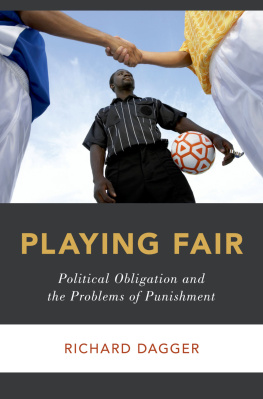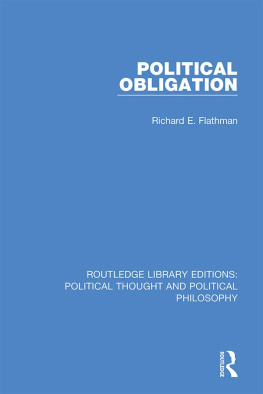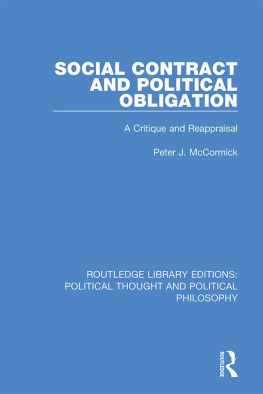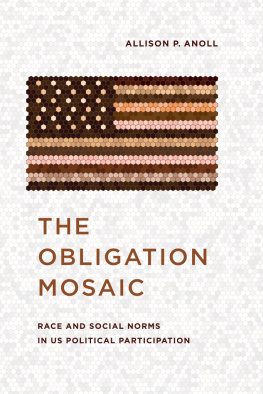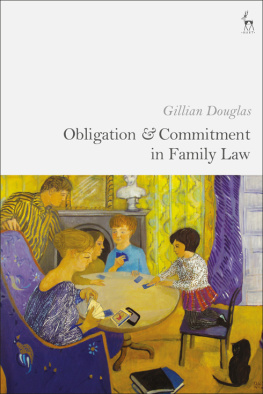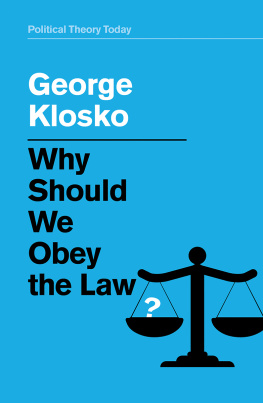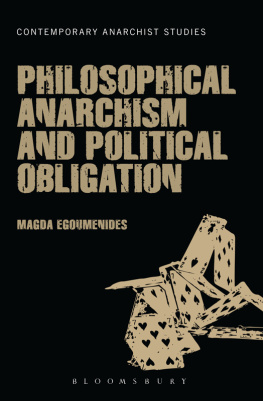Playing Fair
Recent Titles in
Studies in Penal Theory and Philosophy
R.A. Duff, Michael Tonry, General Editors
Popular Punishment
On the Normative Significance of Public Opinion
Jesper Ryberg and Julian V. Roberts
Just Sentencing
Principles and Procedures for a Workable System
Richard S. Frase
Punishment, Participatory Democracy, and the Jury
Albert W. Dzur
Retributivism Has a Past
Has It a Future?
Edited by Michael Tonry
Taming the Presumption of Innocence
Richard Lippke
Sentencing Multiple Crimes
Edited by Jesper Ryberg, Julian V. Roberts and Jan W. de Keijser
Playing Fair
Political Obligation and the Problems of Punishment
Richard Dagger

Oxford University Press is a department of the University of Oxford. It furthers the Universitys objective of excellence in research, scholarship, and education by publishing worldwide. Oxford is a registered trade mark of Oxford University Press in the UK and certain other countries.
Published in the United States of America by Oxford University Press
198 Madison Avenue, New York, NY 10016, United States of America.
Oxford University Press 2018
All rights reserved. No part of this publication may be reproduced, stored in a retrieval system, or transmitted, in any form or by any means, without the prior permission in writing of Oxford University Press, or as expressly permitted by law, by license, or under terms agreed with the appropriate reproduction rights organization. Inquiries concerning reproduction outside the scope of the above should be sent to the Rights Department, Oxford University Press, at the address above.
You must not circulate this work in any other form and you must impose this same condition on any acquirer.
Library of Congress Cataloging-in-Publication Data
Names: Dagger, Richard.
Title: Playing fair : political obligation and the
problems of punishment / Richard Dagger.
Description: New York, NY : Oxford University Press, 2018. |
Series: Studies in penal theory and philosophy |
Includes bibliographical references and index.
Identifiers: LCCN 2017054226 | ISBN 9780199388837 (hardback) |
ISBN 9780199388844 (updf) | ISBN 9780190884789 (epub)
Subjects: LCSH: Political obligation. | Civil society. |
PunishmentPhilosophy. | BISAC: PHILOSOPHY / Political. |
POLITICAL SCIENCE / History & Theory. | LAW / Jurisprudence.
Classification: LCC JC329.5.D34 2018 | DDC 320.01/1dc23
LC record available at https://lccn.loc.gov/2017054226
For Barbara, Emily, Elizabeth, and Julia
CONTENTS
Like many an author of a book long in the making, I have accumulated numerous debts in the years I have been drafting, or not, this book. If I fail to acknowledge the assistance of some who deserve notice here, as I no doubt will, I hope the neglected parties will attribute this oversight to a lapse of memory rather than a lack of gratitude.
For I am grateful indeed to the many institutions and people who contributed in various ways to the publication of this book. In addition to the editorial staff at Oxford University Press for their assistance, I am indebted to Arizona State University and the University of Richmond for sabbatical leaves and summer fellowships that enabled me to begin the book and finally bring it to completion. Even more important was the support I received from the Center for Ethics and Public Affairs at Tulane University, which granted me a research fellowship for 200506, the year in which I started to forge a few articles and scattered thoughts into a book. Before I could set to work at Tulane, however, Hurricane Katrina drove my wife and me, along with hundreds of thousands of others, out of New Orleans. In the ensuing chaos, the CEPA staff went far beyond the call of duty as they worked to salvage the year for its 200506 research fellows: Allison Denham, Jonathan Quong, Elaine Sternberg, and myself. We all owe a profound debt to the Centers Director, Rick Teichgraeber, and Assistant Director, Meg Keenan, for their supererogatory efforts on our behalf.
Among other amazing deeds, Rick secured a new home for the CEPA Fellows when it became clear that Tulane would not reopen until the spring semester of 2006, at the earliest. Thus it was that, three weeks after Katrina struck New Orleans, my wife and I found ourselves in Lexington, Virginia, where Washington and Lee University was to prove a most gracious host for the next eight months. The faculty and staff of W&L, and the people of Lexington in general, went out of their way to help the refugees from New Orleans, and for their kind assistance I shall always be grateful. In particular, I am indebted to Bob Strong of the Political Science Department, who worked with Rick and Meg to bring the CEPA Fellows to W&L, and to the indefatigable Greg Cooper of the Philosophy Department, who was the principal liaison between the CEPA Fellows and the W&L administration throughout the year. It is not too much to say that these four people were largely responsible for turning a catastrophe into a remarkably pleasant and productive stay in the Shenandoah Valley. Three other members of the W&L Philosophy DepartmentMelina Bell, James Mahon, and Lad Sessionsalso contributed greatly to our intellectual and emotional well-being through those months in Lexington.
During the three weeks between New Orleans and Lexington, my wife and I were the unexpected guests of Steve and Sue Oehmen of Germantown, Tennessee, old friends with whom we had almost fallen out of contact. We had the Oehmens telephone number with us in New Orleans, however, and one phone call as we drove north on Interstate 55 through Mississippi brought their unhesitating invitation to stay with them as long as necessary. For their generosity, hospitality, and good cheer in those uncertain days in the Memphis area, I remain deeply appreciative.
Among those who helped more directly with the writing of this book, my foremost debts are to Antony Duff, George Klosko, and Jeffrie Murphy. None of them agrees completely with the ideas expressed within these pagesnot even George, who has often joked that he and I formed a two-person fairness networkbut each has been indispensable to the development of the arguments to be found in them. In addition to many conversations and exchanges over the last quarter century, George also read the penultimate draft of the chapters on political obligation and offered numerous acute comments and helpful suggestions. Antony and Jeff have both encouraged and refined my writing on punishment for many years now, through the example of their own distinguished scholarship, in conversation, and by the comments they have provided on the many papers and drafts that eventually found their way into this book. To them and to George, I am most grateful.
Others who have contributed to this book, in some cases before I even was thinking of writing it, are Terry Ball, Chris Bennett, Samantha Besson, David Boonin, Jack Crittenden, Bill Edmundson, John Horton, Zach Hoskins, Youngjae Lee, Claudio Lopez-Guerra, Daniel MacDermott, David Mapel, Sandra Marshall, Matt Matravers, David Miller, Herbert Morris, Jon Quong, George Sher, Mary Sigler, Avital Simhony, Peter Steinberger, and Kit Wellman. To all I am grateful, as I am to those who joined in the discussion of early drafts of parts of the book I presented at the

